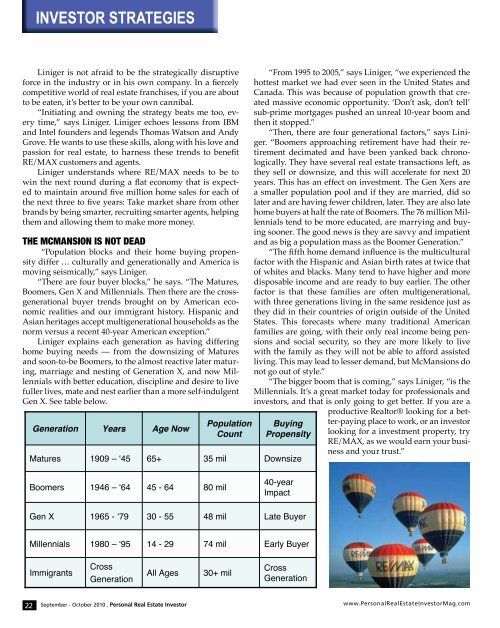How To Be A Successful Real Estate Investor - Bill Duffey
How To Be A Successful Real Estate Investor - Bill Duffey
How To Be A Successful Real Estate Investor - Bill Duffey
Create successful ePaper yourself
Turn your PDF publications into a flip-book with our unique Google optimized e-Paper software.
22<br />
INVESTOR STRATEGIES<br />
Liniger is not afraid to be the strategically disruptive<br />
force in the industry or in his own company. In a fiercely<br />
competitive world of real estate franchises, if you are about<br />
to be eaten, it’s better to be your own cannibal.<br />
“Initiating and owning the strategy beats me too, every<br />
time,” says Liniger. Liniger echoes lessons from IBM<br />
and Intel founders and legends Thomas Watson and Andy<br />
Grove. He wants to use these skills, along with his love and<br />
passion for real estate, to harness these trends to benefit<br />
RE/MAX customers and agents.<br />
Liniger understands where RE/MAX needs to be to<br />
win the next round during a flat economy that is expected<br />
to maintain around five million home sales for each of<br />
the next three to five years: Take market share from other<br />
brands by being smarter, recruiting smarter agents, helping<br />
them and allowing them to make more money.<br />
THE MCMANSION IS NOT DEAD<br />
“Population blocks and their home buying propensity<br />
differ … culturally and generationally and America is<br />
moving seismically,” says Liniger.<br />
“There are four buyer blocks,” he says. “The Matures,<br />
Boomers, Gen X and Millennials. Then there are the crossgenerational<br />
buyer trends brought on by American economic<br />
realities and our immigrant history. Hispanic and<br />
Asian heritages accept multigenerational households as the<br />
norm versus a recent 40-year American exception.”<br />
Liniger explains each generation as having differing<br />
home buying needs — from the downsizing of Matures<br />
and soon-to-be Boomers, to the almost reactive later maturing,<br />
marriage and nesting of Generation X, and now Millennials<br />
with better education, discipline and desire to live<br />
fuller lives, mate and nest earlier than a more self-indulgent<br />
Gen X. See table below.<br />
Generation<br />
Matures<br />
Boomers<br />
Gen X<br />
Millennials<br />
Immigrants<br />
Years<br />
1909 – ʻ45<br />
1946 – ʻ64<br />
1965 - ʻ79<br />
1980 – ʻ95<br />
Cross<br />
Generation<br />
Age Now<br />
65+<br />
45 - 64<br />
30 - 55<br />
14 - 29<br />
All Ages<br />
September - October 2010 . Personal <strong>Real</strong> <strong>Estate</strong> <strong>Investor</strong><br />
Population<br />
Count<br />
35 mil<br />
80 mil<br />
48 mil<br />
74 mil<br />
30+ mil<br />
“From 1995 to 2005,” says Liniger, “we experienced the<br />
hottest market we had ever seen in the United States and<br />
Canada. This was because of population growth that created<br />
massive economic opportunity. ‘Don’t ask, don’t tell’<br />
sub-prime mortgages pushed an unreal 10-year boom and<br />
then it stopped.”<br />
“Then, there are four generational factors,” says Liniger.<br />
“Boomers approaching retirement have had their retirement<br />
decimated and have been yanked back chronologically.<br />
They have several real estate transactions left, as<br />
they sell or downsize, and this will accelerate for next 20<br />
years. This has an effect on investment. The Gen Xers are<br />
a smaller population pool and if they are married, did so<br />
later and are having fewer children, later. They are also late<br />
home buyers at half the rate of Boomers. The 76 million Millennials<br />
tend to be more educated, are marrying and buying<br />
sooner. The good news is they are savvy and impatient<br />
and as big a population mass as the Boomer Generation.”<br />
“The fifth home demand influence is the multicultural<br />
factor with the Hispanic and Asian birth rates at twice that<br />
of whites and blacks. Many tend to have higher and more<br />
disposable income and are ready to buy earlier. The other<br />
factor is that these families are often multigenerational,<br />
with three generations living in the same residence just as<br />
they did in their countries of origin outside of the United<br />
States. This forecasts where many traditional American<br />
families are going, with their only real income being pensions<br />
and social security, so they are more likely to live<br />
with the family as they will not be able to afford assisted<br />
living. This may lead to lesser demand, but McMansions do<br />
not go out of style.”<br />
“The bigger boom that is coming,” says Liniger, “is the<br />
Millennials. It’s a great market today for professionals and<br />
investors, and that is only going to get better. If you are a<br />
productive <strong>Real</strong>tor® looking for a bet-<br />
Buying<br />
Propensity<br />
Downsize<br />
40-year<br />
Impact<br />
Late Buyer<br />
Early Buyer<br />
Cross<br />
Generation<br />
ter-paying place to work, or an investor<br />
looking for a investment property, try<br />
RE/MAX, as we would earn your business<br />
and your trust.”<br />
www.Personal<strong>Real</strong><strong>Estate</strong><strong>Investor</strong>Mag.com


